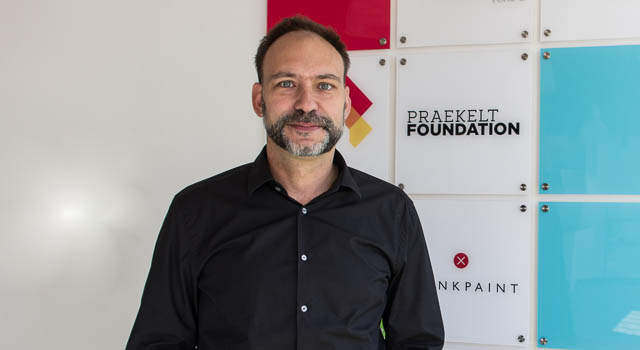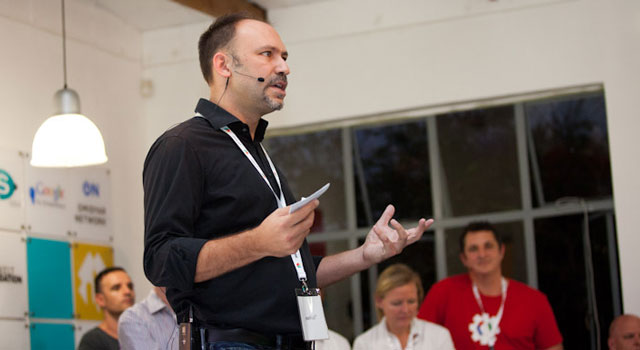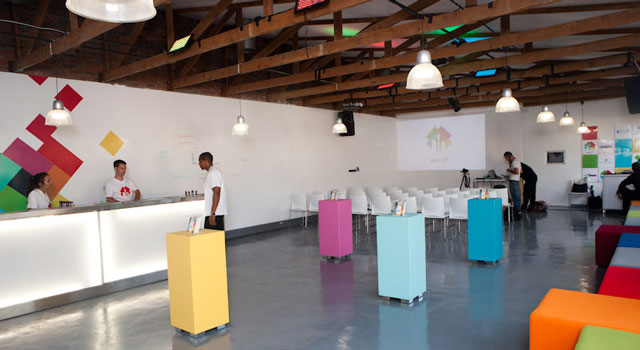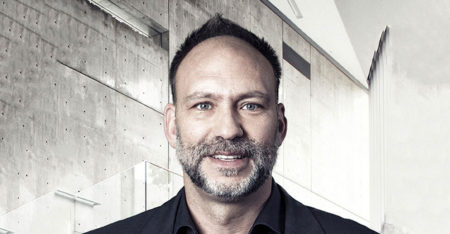
Almost everyone has a mobile phone, however basic, making it the perfect tool to educate, market to or communicate with consumers. Taking this premise as its starting point, 42-year-old South African Gustav Praekelt started the Praekelt Foundation as a place to create applications and services for basic mobile phones that improve people’s lives and get pertinent information to them efficiently.
While some of its projects are traditional for-profit initiatives, others are funded by large companies looking to meet their corporate social investment requirements.
The foundation has been involved in projects in 15 countries in sub-Saharan Africa, including Nigeria, Kenya, Cameroon, Ghana, Democratic Republic of Congo, Uganda, Tanzania and Zimbabwe. The foundation is also planning to expand its reach to India this year.
“I’m from Geekville,” Praekelt tells me in the boardroom of the foundation’s Johannesburg office as our interview gets underway. “I got my first Atari when I was 11.”
Dressed in a plain-black collared shirt, jeans and running shoes, and sporting a neatly trimmed beard, flecked with grey, Praekelt, part philanthropist and part entrepreneur, is a commanding figure, even when dressed down.
The Praekelt Foundation, which he started in 2007, focuses on mobile technology and mixes commercial and charitable endeavours. Sometimes it even combines the two by turning nonprofit organisations into for-profit ventures for the sake of sustainability.
“In 2001, I visited Dar es Salaam and was amazed to see that everyone had a mobile phone — which is something we take for granted now — and that people were using them more for texting than for calling.
“I realised this was the next wave. Tanzania still had regular outbreaks of cholera at the time, but everyone had mobile phones, which told me that obviously the country wasn’t dealing well with urbanisation.
“That was my ‘eureka’ moment: ‘Everyone’s going to have a mobile phone and there’s money to be made getting information to them’.”
From charity to profits
Praekelt is interested in using “philanthropic money” to invest in the sort of high-risk activities traditional funders and entrepreneurs avoid and trying to turn these projects into profitable ventures to ensure they last.
This money could come from a large company’s corporate social investment coffers, as is the case of mobile operator Vodacom, which invests in projects aligned to its core business.

Praekelt says another increasingly common source of funds is “impact investment”, or investment with a social agenda and the “specific aim of getting a dividend in terms of social impact”.
The foundation has created a number of mobile products that can be used for both commercial and charitable ends. Vumi, for example, is a “super-scalable conversation engine” that allows for the quick development and deployment of a mobile forum. Another, TxtAlert, improves adherence to antiretroviral treatment by sending patients SMS reminders, allowing them to schedule appointments at the clinic.
If a company wants to use one of the Praekelt Foundation’s products for profit, it is sold to the company. If, however, a charity wants to use it, the foundation offers it the necessary software and service for free, or at a discounted rate.
Praekelt moved to Canada after completing high school in Pretoria to study computer science, music, English and philosophy at Montreal’s McGill University. He returned to South Africa in 1990 and finished his studies at Tukkies.
In addition to his interest in computers, he’s always been “obsessed” with language and music. “Language, maths, music, they each have a deeper structure and they’re all interesting to me.” Creativity, he believes, comes from the intersection of these pursuits.
After completing his studies at the end of 1993, Praekelt sold a house he had inherited from a relative who had passed away and used the money to start his first business: an animation studio called Delapse, which offered high-end computer graphics and animation services. It eventually grew too big for Praekelt’s tastes. After experiencing tough times during the dot-com bust and taking on external shareholders, he and the other founders exited the business in 2002, only to have it closed down eventually. “Every entrepreneur needs to have a failure somewhere,” he says.
Jozi’s hub
Earlier this year, the Praekelt Foundation opened JoziHub, a shared work space and technology hub that Praekelt says is intended to nurture local technology entrepreneurs. The venue, at Johannesburg’s 44 Stanley complex in Milpark, is also available for free to any event “that is aligned with JoziHub’s goals” and has hosted at least one event a month since it opened its doors.
“There aren’t enough young entrepreneurs in South Africa, especially previously disadvantaged ones. Ask any entrepreneur what’s most important for their business in the long term and it’s a stable socioeconomic environment,” Praekelt says.
“Government can create the environment, but it can’t employ every unemployed person. We need to give people the chance to start their own businesses and to show them role models and mentors so that they don’t feel they have to go and work for big corporations after studying.”

Praekelt wants to see more “black Elon Musks who stay here after they make it”.
One of the novel things about the foundation is that much of its success to date has been found in other African countries. While many countries use South Africa as the springboard into the rest of continent, the foundation has taken the reverse approach.
It’s currently involved in a project to make Wikipedia available to users of basic mobile handsets using USSD codes on 2G networks.
“We’re launching the service in East Africa with a three-month free trial, but that doesn’t scale long term, so we’re looking at a freemium model,” he says. This isn’t a solution that works for every problem, but it’s well-suited to things like information portals that can be subsidised with related advertising or backing from local partnerships.
Downtime
Praekelt says he has long loved running and boxing. He runs the 9km from his Hyde Park home to his office in Milpark a few mornings each week and belongs to a professional boxing gym.
“Both are very democratic sports in that you don’t need much equipment. I really love boxing because, although you can still think about work when you’re running, you can’t when you’re boxing.”
Praekelt also keeps his interest in music alive by playing jazz guitar. “At one point, I want to play live again, that’s the big dream,” he says.
His long-term romantic partner is Samantha Manclark, who heads communications company Speakers Corner. She’s also recently started a nonprofit organisation called Better World Network to help other nonprofits “tell their stories more effectively”. — (c) 2013 NewsCentral Media




